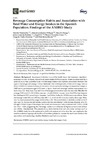Please use this identifier to cite or link to this item:
https://accedacris.ulpgc.es/jspui/handle/10553/18508
| Title: | Beverage consumption habits and association with total water and energy intakes in the Spanish population: Findings of the ANIBES study | Authors: | Nissensohn, Mariela Sánchez-Villegas, Almudena Ortega, Rosa M. Aranceta-Bartrina, Javier Gil, Ángel González-Gross, Marcela Varela-Moreiras, Gregorio Serra-Majem, Lluis |
UNESCO Clasification: | 3206 Ciencias de la nutrición | Keywords: | ANIBES Total water intake Energy intake Beverages Spain |
Issue Date: | 2016 | Journal: | Nutrients | Abstract: | Background: Inadequate hydration is a public health issue that imposes a significant economic burden. In Spain, data of total water intake (TWI) are scarce. There is a clear need for a national study that quantifies water and beverage intakes and explores associations between the types of beverages and energy intakes. Methods: The Anthropometry, Intake and Energy Balance Study ANIBES is a national survey of diet and nutrition conducted among a representative sample of 2285 healthy participants aged 9–75 years in Spain. Food and beverage intakes were assessed in a food diary over three days. Day and time of beverage consumption were also recorded. Results: On average, TWI was 1.7 L (SE 21.2) for men and 1.6 L (SE 18.9) for women. More than 75% of participants had inadequate TWI, according to European Food Safety Authority (EFSA) recommendations. Mean total energy intake (EI) was 1810 kcal/day (SE 11.1), of which 12% was provided by beverages. Water was the most consumed beverage, followed by milk. The contribution of alcoholic drinks to the EI was near 3%. For caloric soft drinks, a relatively low contribution to the EI was obtained, only 2%. Of eight different types of beverages, the variety score was positively correlated with TWI (r = 0.39) and EI (r = 0.23), suggesting that beverage variety is an indicator of higher consumption of food and drinks. Conclusions: The present study demonstrates that well-conducted surveys such as the ANIBES study have the potential to yield rich contextual value data that can emphasize the need to undertake appropriate health and nutrition policies to increase the total water intake at the population level promoting a healthy Mediterranean hydration pattern. | URI: | https://accedacris.ulpgc.es/handle/10553/18508 | ISSN: | 2072-6643 | DOI: | 10.3390/nu8040232 | Source: | Nutrients[EISSN 2072-6643],v. 8 (4), (Abril 2016) | Rights: | by-nc-nd |
| Appears in Collections: | Artículos |
SCOPUSTM
Citations
62
checked on Jun 8, 2025
WEB OF SCIENCETM
Citations
65
checked on Feb 22, 2026
Page view(s)
61
checked on Jan 10, 2026
Download(s)
119
checked on Jan 10, 2026
Google ScholarTM
Check
Altmetric
Share
Export metadata
Items in accedaCRIS are protected by copyright, with all rights reserved, unless otherwise indicated.
